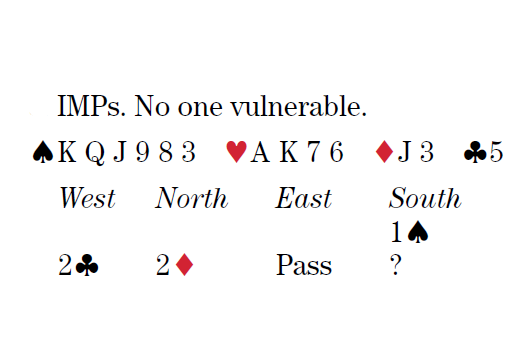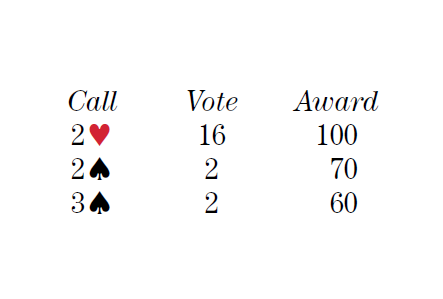
What’s your call?
| 2♥ | 2♠ | 2NT | ||
| 3♣ | 3♦ | 3♥ | 3♠ | 3NT |
| 4♣ | 4♦ | 4♥ | 4♠ | 4NT |
| 5♣ | 5♦ | 5♥ | 5♠ | 5NT |
| 6♣ | 6♦ | 6♥ | 6♠ | 6NT |
| 7♣ | 7♦ | 7♥ | 7♠ | 7NT |
| Dbl | Pass |
Shape up
“2♥ is a new suit, it’s forcing, it’s the cheapest bid and, assuming the hand diagram is correct, I even have four of them!” Weinstein exclaims. “Partner could have as many as five hearts (see problem 1).”
“2♥,” bids Rigal, “no need to deceive partner about my basic shape. Bart Bramley says, ‘Bidding your second suit shows nine of your 13 cards, while repeating your long suit shows six.’ And he has a point — I can bid 3♠ next to show my 6–4 game force, which is what I have.”
Meyers agrees. “Showing shape is important. 2♥, and then I will bid spades again later.”
“I would play that 2♠ could be passed,” adds Sanborn, “so I cannot afford to bid that. So the question is, do I bid 2♥ in light of no negative double or do I bid 3♠? I like 2♥ so that I can bid 3♠ next time and create a forcing auction. It doesn’t take much to make a game with this.”
“2♥,” agrees Meckstroth. “When I bid 3♠ on the next round, I will have shown 6–4 just like I have!”
“Jumping around might deprive us of useful space,” note Isfeld and Henneberger. “Although 2♦ was not a game force, it should be forcing to 2NT or three of a suit. We see no reason not to start a pattern of our hand with a forcing 2♥ bid.”
Stack says, “The plan is to bid hearts and then spades again. Partner probably does not have hearts in the absence of a negative double, but by bidding it this way, we will show the correct distribution and strength of the hand.”
Robinson “temporizes” with 2♥. “I’m not sure that 2♠ is forcing.”
“I always introduce the other major with four when it is missing,” says Hampson. “I will try and repeat spades later.”
Looking beyond their 2♥ call, the Sutherlins indicate they would “continue with 3♠ if partner bids 3♣ or 3♦.”
Boehm: “2♥, 3♠ next, leaving room for 3NT or either major-suit fit.”
The Coopers shrug. “2♥. Why is this a problem?”
Cohen contents himself with 2♠. “Usually I like to get a four-card major into the auction, but here, where partner could have made a negative double, I think it more prudent to limit my hand and rebid the good six-card suit.”
The Joyces explain their 2♠ call: “Because partner did not make a negative double, we think the message that we hold six spades is more important than showing four hearts.”
Lawrence opts for 3♠ saying, “Things are not the same when partner’s response is in competition. 2♥ is a close second choice.”

